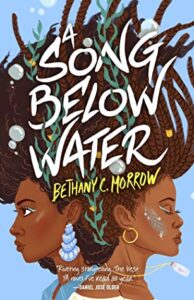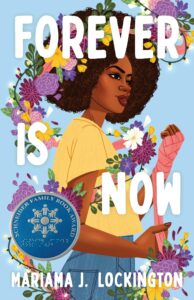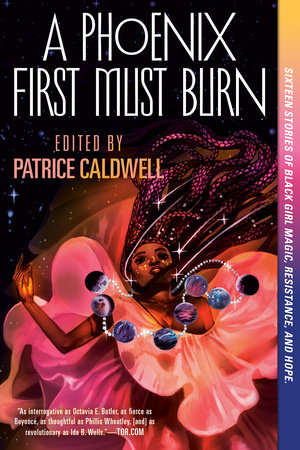Afro YA Holiday Gift Guide: Black Fantasy Edition
Afro YA Holiday Gift Guide
Black Fantasy EditionIt’s officially the holiday season, and books are some of the most fun gifts to give. When I was a teen in the 00s, there weren’t a lot of sci-fi, fantasy, or horror books that featured protagonists my age. Now, there are plenty to choose from. To celebrate this plethora of Black YA speculative fiction, here is a list of fantasy books that I feel are worth introducing to a young reader.
 Legendborn by Tracy Deonn
Legendborn by Tracy Deonn
A contemporary retelling of Arthurian legends, this book tells the story of sixteen-year-old Bree Matthews. After her mother dies in an accident, Bree attends the residental program of her mother’s alma mater, UNC–Chapel Hill. When Bree witnesses a magical attack the first night on campus, a buried memory reveals that a mage calling themselves a “Merlin” was at the hospital where her mother died. In order to find the truth behind her mother’s death, Bree must infiltrate the secret society of knights and mages known as the “Legendborn.” A story of generational trauma and grief with a Black Southern gothic twist, Legendborn is a powerful coming-of-age tale. It is also the first in a series known as the Legendborn cycle, with the second book being titled Bloodmarked and the upcoming third book titled Oathbound.
 The Nightmareverse Series by L. L. McKinney
The Nightmareverse Series by L. L. McKinney
This urban fantasy series is a modern retelling of Alice In Wonderland set in Atlanta, Georgia. Its Black bi heroine, Alice Kingston, is a complex and relatable protagonist who you will root for, and the supporting cast is fun as well. There is also rich lore and worldbuilding that bridges reality and fantasy in a compelling way. With influences that range from the aforementioned Alice in Wonderland to the Japanese anime series Sailor Moon, this book series is a fun and poignant tale of overcoming grief and embracing your own power. Read my review of book 1, book 2, and book 3.
We Are All So Good at Smiling by Amber McBride
Tackling clinical depression through poetry, myth, and folklore, this novel in verse is a powerful and lyrical read. It stars Whimsy, a Black hoodoo conjurer girl with clinical depression who also loves fairy tales. Many years ago, she was touched by Sorrow when her brother Cole disappeared in a magic forest, and she vowed never to enter it again. One day, Whimsy meets Faerry, a Black fae boy who shares struggles and fears similar to Whimsy’s. As the two of them get to know each other, they discover that the forest and Sorrow that haunt them both must be faced head-on. Read my review.
 That Self-Same Metal by Brittany N. Williams
That Self-Same Metal by Brittany N. Williams
Sixteen-year-old Joan Sands is a gifted craftswoman who creates and upkeeps the stage blades for William Shakespeare’s acting company, The King’s Men. Joan’s skill with her blades comes from a magical ability to control metal—an ability gifted by her Head Orisha, Ogun. Because her whole family is Orisha-blessed, the Sands family have always kept tabs on the Fae presence in London. Usually that doesn’t involve much except noting the faint glow around a Fae’s body as they try to blend in with London society, but lately, there has been an uptick in brutal Fae attacks. After Joan wounds a powerful Fae and saves the son of a cruel lord, she is drawn into political intrigue in the human and Fae worlds. Filled with swashbuckling, dark fairy encounters, and our heroine flirting with men and women, this book is a rollicking great time.
 A Song Below Water by Bethany C. Morrow
A Song Below Water by Bethany C. Morrow
Tavia Phillips is a siren who must hide her powers in order to keep herself alive. Her best friend, Effie, is struggling with a painful past and strange happenings in the present. While they are trying to navigate their junior year of high school, a siren murder trial shakes Portland, Oregon, to the core. In the aftermath, Tavia and Effie must come together and come to terms with themselves. Read my 2020 review.
Bad Witch Burning by Jessica Lewis
by Jessica Lewis
Katrell doesn’t mind talking to the dead; she just wishes it made more money. Clients pay her to talk to their deceased loved ones, but it isn’t enough to support her unemployed mother and Mom’s deadbeat boyfriend-of-the-week. But magic doesn’t come for free, and soon dark forces are closing in on Katrell. The further she goes, the more she risks the lives of not only herself, but those she loves. Katrell faces a choice: resign herself to poverty or confront the darkness before it’s too late.

The Afro YA promotes black young adult authors and YA books with black characters, especially those that influence Pennington, an aspiring YA author who believes that black YA readers need diverse books, creators, and stories so that they don’t have to search for their experiences like she did.
Latonya Pennington is a poet and freelance pop culture critic. Their freelance work can also be found at PRIDE, Wear Your Voice magazine, and Black Sci-fi. As a poet, they have been published in Fiyah Lit magazine, Scribes of Nyota, and Argot magazine among others.




 As a result, the poetry that makes up the crux of the character development shines a little brighter, too. Each character shares one to three poems that put their feelings, experiences, and passions on display. Some highlights include Jenesis Whyte’s “Foster Kid,” Marcel Dixon’s “Sweep,” “Private Pain” by Darrian Lopez, and “Anxiety” by Angela Marie Bailey. These poems tackle various topics, ranging from racist drug sweeps to grief to personal insecurities. One line I enjoyed was from Jenesis’ poem: “Mostly, I march through my days / footsteps falling on deaf ears / even when I stomp.”
As a result, the poetry that makes up the crux of the character development shines a little brighter, too. Each character shares one to three poems that put their feelings, experiences, and passions on display. Some highlights include Jenesis Whyte’s “Foster Kid,” Marcel Dixon’s “Sweep,” “Private Pain” by Darrian Lopez, and “Anxiety” by Angela Marie Bailey. These poems tackle various topics, ranging from racist drug sweeps to grief to personal insecurities. One line I enjoyed was from Jenesis’ poem: “Mostly, I march through my days / footsteps falling on deaf ears / even when I stomp.” Not only does her girlfriend deliver bad news, but the two of them also witness an incident of police brutality on a nearby lake. As a result, Sadie’s dormant agoraphobia comes out in full force. While taking the steps to heal and manage her mental health, Sadie gradually rebuilds a safe place inside herself while finding the strength to use her voice.
Not only does her girlfriend deliver bad news, but the two of them also witness an incident of police brutality on a nearby lake. As a result, Sadie’s dormant agoraphobia comes out in full force. While taking the steps to heal and manage her mental health, Sadie gradually rebuilds a safe place inside herself while finding the strength to use her voice. One of the first things that I came to appreciate about this anthology is how varied the stories are in terms of genre and setting. One story, “Gilded” by Elizabeth Acevedo, is set in the Americas in 1522 and features an enslaved Black woman who has the ability to bend metal. According to the editor’s note at the end of the book, this story is Acevedo’s interpretation of the first major slave revolt.
One of the first things that I came to appreciate about this anthology is how varied the stories are in terms of genre and setting. One story, “Gilded” by Elizabeth Acevedo, is set in the Americas in 1522 and features an enslaved Black woman who has the ability to bend metal. According to the editor’s note at the end of the book, this story is Acevedo’s interpretation of the first major slave revolt. 





 Miles Morales Suspended
Miles Morales Suspended Cool. Awkward. Black.
Cool. Awkward. Black.
 The Nightmare-Verse Trilogy
The Nightmare-Verse Trilogy
Recent Comments